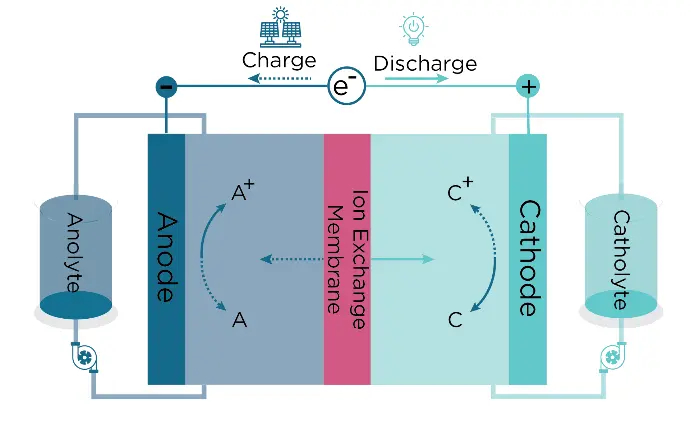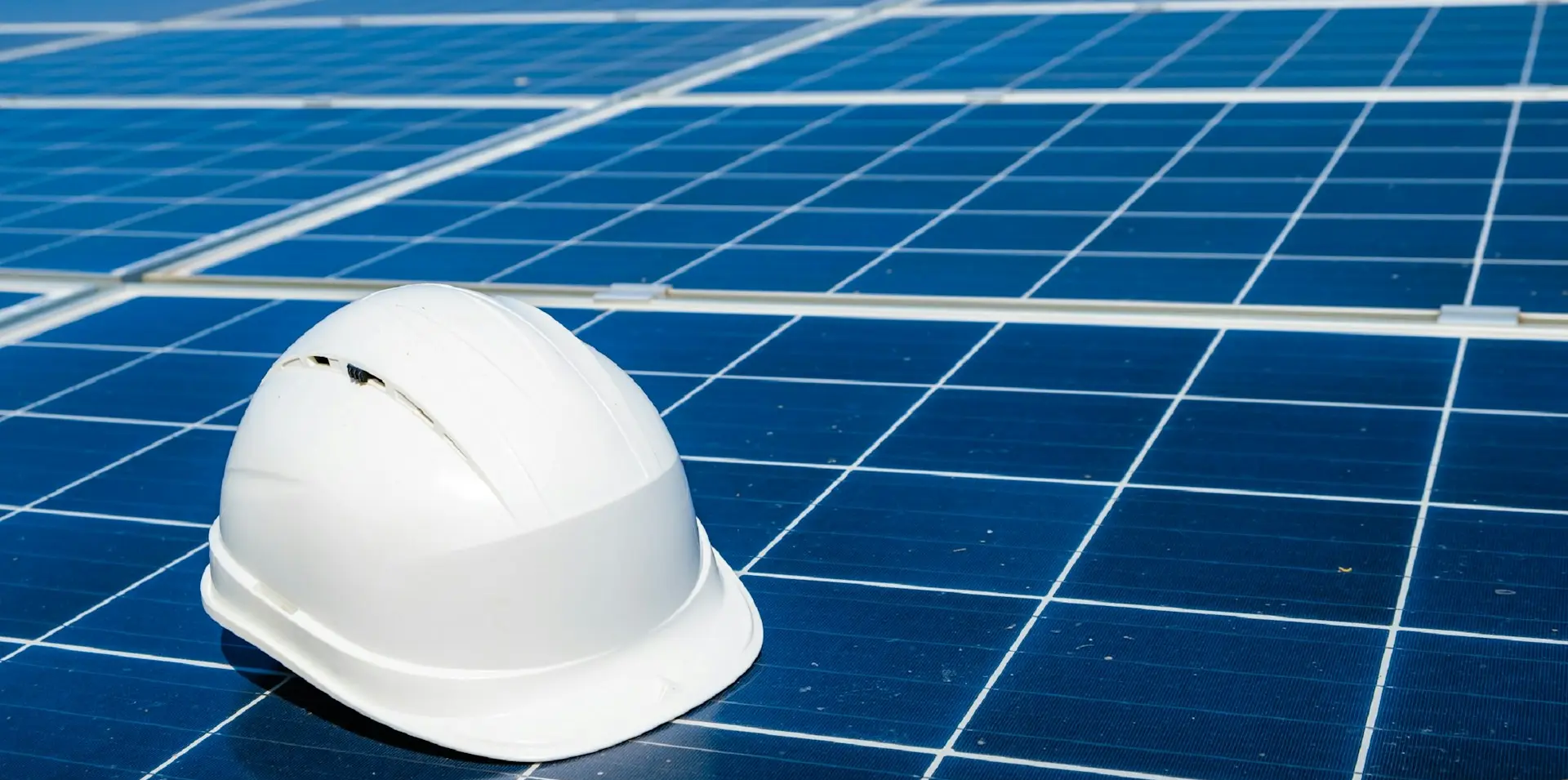Flow Batteries Engineering
Flow batteries are advanced energy storage systems that use liquid electrolytes to store and release energy efficiently. They offer robust, long-duration storage solutions, ideal for balancing renewable energy supply and demand.
Our dedicated team supports you through every phase of flow battery project development, from initial assessment and system design to installation and project management. Our comprehensive approach ensures each project is customized to meet the specific requirements of our clients, providing reliable, scalable, and cost-effective energy storage solutions.
Are you an EPC, project developer, consultant, or commercial business working on an energy storage project? Reach out to us and discover the innovative potential of flow batteries and their critical role in creating a resilient and sustainable energy infrastructure.
A Future-Proof Energy Storage Solution
As renewable energy sources like wind and solar become more prevalent, the demand for efficient energy storage solutions to manage intermittent supply and demand spikes is rising. Flow batteries stand out as a particularly promising technology to provide a robust solution to store excess energy and release it when needed, ensuring a stable and reliable power supply.
What Are Flow Batteries?

Flow batteries store energy in liquid electrolytes contained in external tanks, which are pumped through a cell stack where the electrochemical reactions occur. This unique design allows for easy scalability and long cycle life, making them ideal for large-scale energy storage.
Why Choose Us for Your Energy Storage Projects?
Our expertise in electrochemistry and deep understanding of the latest advancements in battery technology enable us to provide comprehensive support for your projects. From initial feasibility studies and design optimization to project management, we are your trusted partner in realizing the full potential of flow battery technology.
Feasibility Studies
We conduct thorough feasibility studies to help you assess the technical and economic viability of your flow batteries projects.
Our studies include resource availability assessments and integration possibilities with existing infrastructure, along with environmental impact analyses to ensure regulatory compliance.

System Design and Engineering
Our engineering team provides comprehensive design services for flow battery systems.
We specialize in creating integration designs that seamlessly connect flow battery systems with renewable energy sources and your existing energy infrastructure, with a special focus on efficiency, reliability and costs.


Project Management
We offer project management services designed to ensure the seamless execution of your flow battery projects throughout the project lifecycle
Frequently Asked Questions
A flow battery is a type of rechargeable battery where the energy is stored in liquid electrolytes contained in external tanks. These electrolytes are pumped through a cell stack where the electrochemical reactions occur, converting chemical energy into electrical energy and vice versa. The key components of a flow battery include the cell stack, electrolyte tanks, pumps, and a power management system.
This design allows for easy scalability, long cycle life, and the ability to quickly recharge by replacing the electrolyte liquid, making flow batteries particularly suitable for large-scale energy storage applications.
Flow batteries offer several key advantages over traditional batteries:
- Scalability: Flow batteries can easily be scaled up by increasing the size of the electrolyte tanks, allowing for flexible energy storage capacity to meet varying demands.
- Long Cycle Life: Unlike traditional batteries that degrade over time, flow batteries can undergo many more charge-discharge cycles with minimal degradation, leading to a longer lifespan.
- Safety: Flow batteries use non-flammable, non-toxic electrolytes, reducing the risk of fire and making them safer for large-scale applications.
- Efficiency: Flow batteries have high round-trip efficiency, meaning that a large percentage of the energy put into the battery can be retrieved during discharge.
- Cost-Effectiveness: Over the long term, the operational and maintenance costs of flow batteries are typically lower due to their durability and the ease of replacing electrolytes without the need for expensive components.
- Environmental Impact: Many flow batteries use environmentally friendly materials, and their components can often be recycled or repurposed, reducing their overall environmental footprint.
Flow batteries and lithium-ion batteries each have their own strengths and are suited to different applications:
- Scalability:
- Flow Batteries: Easily scalable by increasing electrolyte tank size, making them ideal for large-scale energy storage systems.
- Lithium-Ion Batteries: Scaling up requires adding more cells, which can be more complex and costly for very large applications.
- Cycle Life:
- Flow Batteries: Can handle many more charge-discharge cycles with minimal degradation, resulting in a longer lifespan.
- Lithium-Ion Batteries: Tend to degrade over time, with a finite number of cycles before performance significantly drops.
- Safety:
- Flow Batteries: Use non-flammable, non-toxic electrolytes, reducing fire risks.
- Lithium-Ion Batteries: Can pose fire hazards due to the flammable electrolyte and thermal runaway risks.
- Energy Density:
- Flow Batteries: Generally have lower energy density, meaning they take up more space for the same amount of energy storage.
- Lithium-Ion Batteries: Have a higher energy density, making them suitable for applications where space is limited, like in portable electronics and electric vehicles.
- Cost:
- Flow Batteries: Higher initial setup costs but lower operational and maintenance costs over the long term.
- Lithium-Ion Batteries: Lower initial costs but higher lifecycle costs due to the need for replacements and potential safety measures.
- Efficiency:
- Flow Batteries: Typically have a lower round-trip efficiency compared to lithium-ion, though they are improving.
- Lithium-Ion Batteries: Generally offer higher round-trip efficiency, meaning they convert and store energy more effectively.
- Environmental Impact:
- Flow Batteries: Often use more environmentally friendly materials and their components can be recycled or repurposed.
- Lithium-Ion Batteries: Use materials like cobalt and lithium, which have significant environmental and ethical mining concerns, and recycling can be challenging.
Overall, flow batteries are better suited for large-scale, long-duration energy storage where space and weight are less critical, while lithium-ion batteries are preferred for high energy density applications like portable devices and electric vehicles.
Flow batteries are particularly well-suited for a range of applications that require large-scale, long-duration energy storage:
- Grid Energy Storage: Supporting renewable energy integration by storing excess energy from solar and wind farms and providing load balancing to ensure a stable power supply.
- Microgrids: Offering reliable backup power for remote or off-grid locations, ensuring energy independence and stability.
- Industrial and Commercial Facilities: Reducing energy costs through demand charge management and peak shaving, while providing backup power during outages.
- Utility-Scale Projects: Providing scalable energy storage solutions for large utility operations, enhancing grid reliability.
- Energy Arbitrage: Storing energy when prices are low and discharging it when prices are high to capitalize on market fluctuations.
These are some of the many applications that can leverage the scalability, safety, and long cycle life of flow batteries, making them a reliable choice for diverse energy storage needs.
Flow battery systems typically have a long lifespan, often exceeding 20 years, due to their unique design and operational characteristics. Unlike traditional batteries, flow batteries experience minimal degradation over time because the electrochemical reactions occur in liquid electrolytes rather than solid electrodes. This allows them to endure thousands of charge-discharge cycles with consistent performance. Additionally, components such as the pumps and tanks are robust and can be maintained or replaced relatively easily, further extending the system’s operational life and making flow batteries a durable and cost-effective energy storage solution.
Flow batteries offer several environmental benefits:
- Non-Toxic Materials: Many flow batteries use non-toxic and abundant materials, reducing the environmental impact associated with resource extraction and disposal.
- Long Lifespan: Their extended lifespan and ability to endure thousands of cycles without significant degradation mean fewer replacements and less waste compared to traditional batteries.
- Recyclability: The materials in flow batteries, such as the liquid electrolytes, can often be recycled or reused, minimizing waste and resource consumption.
- Reduced Fire Risk: Flow batteries use non-flammable electrolytes, reducing the risk of fires and associated environmental hazards.
- Support for Renewable Energy: By effectively storing renewable energy, flow batteries help reduce reliance on fossil fuels and decrease greenhouse gas emissions.
These features make flow batteries a sustainable choice for energy storage, supporting cleaner and more environmentally friendly energy systems.
Yes, flow batteries are considered safe to use due to several key factors:
- Non-Flammable Electrolytes: Flow batteries use liquid electrolytes that are typically non-flammable, reducing the risk of fire hazards compared to batteries with combustible components.
- Stable Chemical Reactions: The electrochemical reactions in flow batteries occur in a controlled environment, minimizing the risk of thermal runaway or explosive failures.
- Low Pressure Operation: Flow batteries generally operate at ambient temperature and pressure, reducing the risks associated with high-pressure systems.
- Safe for Large-Scale Applications: Their design and materials make them suitable for large-scale energy storage solutions without compromising safety.
Flow battery technology faces several challenges:
- Cost: The initial capital cost of flow batteries can be higher than that of other battery technologies, making them less attractive for some applications despite their long-term cost benefits.
- Energy Density: Flow batteries generally have lower energy density compared to lithium-ion batteries, requiring larger physical space for the same amount of energy storage.
- Electrolyte Management: Proper management and containment of liquid electrolytes are crucial to prevent leaks and ensure efficient operation.
- Limited Market Adoption: Compared to more established technologies like lithium-ion, flow batteries are still gaining traction, which can limit economies of scale and drive up costs.
Addressing these challenges involves ongoing research and development to improve cost efficiency, energy density, and system integration to enhance the competitiveness of flow batteries in the energy storage market.
At Ionect, we offer specialized support in three key areas:
- Feasibility Studies: We evaluate your project's technical and economic viability, providing insights on site conditions, energy needs, and compliance.
- System Design and Engineering: Our team engineers flow battery systems to optimize performance and ensure seamless integration with existing infrastructure.
- Project Management: We manage all project phases, ensuring timelines, budgets, and quality standards are met for successful execution and delivery.
Our expertise ensures comprehensive support for your flow battery project. Reach out to learn more.
Ready to revolutionize your energy storage?
Dive into the world of flow batteries and elevate your energy solutions. Reach out to us today to discover how our services can boost your projects and support your sustainability ambitions. Together, let's lead the charge toward a greener tomorrow!